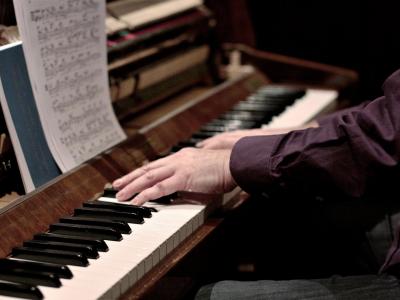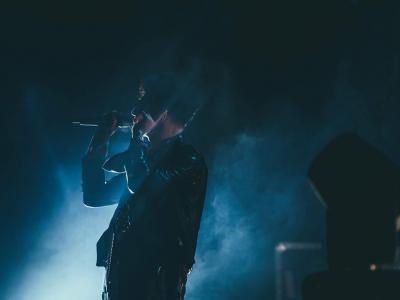Transform your keyboard skills into a creative tool for writing, producing, and performing music in modern contexts. This undergraduate piano course will build upon your technique and musical understanding, helping you use keyboards and controllers effectively for uses across production, media, and electronic music.
Key Learning Outcomes
- Use the keyboard as a creative tool for writing, producing, and performing music in electronic and media-focused contexts
- Perform stylistically accurate keyboard parts using virtual instruments, including drums, bass, guitars, strings, brass, and synthesizers
- Apply keyboard performance skills directly within DAW-based composition and production workflows
- Use controllers and performance gestures to shape expression, articulation, and sound design in modern productions
Course Description
The keyboard is a complete instrument for the writer, arranger, and producer, capable of playing any type of part, including bass lines, chords, and melodies. For the modern musician utilizing digital audio workstations and virtual instruments, the keyboard is also the most effective input device for sequencing and score creation. Developing your keyboard playing will strengthen your knowledge of theory and enable you to more efficiently create great sounding productions.
Keyboard for the Electronic Musician is aimed at the beginner or early stage keyboard player who wants to build skills that will help them write, produce, and perform using keyboards ranging from acoustic piano to modern controllers with virtual instruments. Along with the development of healthy fundamental playing techniques, the course develops your skills through an exploration of music and musical parts used in a wide variety of genres, including pop, rock, R&B, gaming, film, and television scores.
Each week, you’ll be assigned exercises and songs supported with audio and video examples and audio play-alongs to give you a real sense of performing in a production. In addition to weekly assignments, you’ll have the option to submit weekly bonus assignment that display a greater command of the controller and production techniques presented in the lesson.
By the end of this course, you will be able to:
- Read and interpret notated music expressively using the grand staff
- Play chord symbols fluently to support harmonic textures in a variety of musical settings
- Apply keyboard technique and hand independence to perform contemporary accompaniment patterns and grooves
- Integrate velocity, dynamics, and articulation to control virtual instruments musically
- Perform keyboard parts derived from recorded music to strengthen stylistic awareness and production insight
Syllabus
Lesson 1: The Grand Staff
- The Grand Staff
- Workshop: Playing Notes from the Grand Staff
- Rhythm and Time Signature
- First Position Melodies
- Second Position Melodies
- Keyboard Action
- Assignment 1: Second Position Melodies and Tied Notes
Lesson 2: Half Steps and Whole Steps, Sharps, and Flats
- Sharps and Flats
- Workshop: Playing Accidentals
- Workshop: Half Steps and Whole Steps
- The Eighth Note
- Beyond the Five-Note Range
- Dynamics and Controlling Velocity
- Production Techniques—Drum Groove
- Assignment 2.1: The Eighth Note and Pickup Measures
- Assignment 2.2: Beyond the Five-Note Range
- Assignment 2.3: Bonus, Drum Grooves
Lesson 3: Major Scales and Major Key Signatures
- Major Scales and Key Signatures
- Workshop: Major Scales
- Dotted Rhythms
- Major Triads
- Controllers—The Modulation Wheel
- Production Techniques—Synth Line Hooks
- Assignment 3.1: Dotted Rhythms
- Assignment 3.2: Major Triads
- Assignment 3.3: Bonus, Synth Line Hooks
Lesson 4: Interval Studies and Minor Triads
- Interval Studies
- The Keys of F and B♭
- Minor Triads
- Controllers—Sustain Pedal
- Production Techniques—Bass Lines
- Assignment 4.1: The Key of B♭
- Assignment 4.2: Minor Triads
- Assignment 4.3: Bonus, Bass Lines
Lesson 5: Diatonic Songs
- Diatonic Chords
- Workshop: Diatonic Chords
- Diatonic Progressions with Voice Leading
- Musical Form and the Lead Sheet
- Controllers—Pitch Bend
- Production Techniques—Electric Guitars
- Assignments 5.1 and 5.2: Diatonic Progressions with Voice Leading
- Assignment 5.3: Bonus, Acoustic Guitar
Lesson 6: Accompaniment Patterns
- The British Invasion with Broken Chord Patterns
- 6/8 Time Signatures and a Different British Invasion
- Technique Builders—Chromatic Movement - Repeated Notes
- Controllers—Assignable Buttons and Switches
- Production Techniques—Acoustic Guitars
- Assignment 6.1: The British Invasion with Broken Chord Patterns
- Assignment 6.2: Technique Builders—Chromatic Movement - Repeated Notes
- Assignment 6.3: Bonus, Repeated Notes/Acoustic Guitars
Lesson 7: Seventh Chords and Sixteenth Grooves
- Sixteenth Notes
- Diatonic Seventh Chords
- Diatonic Seventh Chords—”Color My World”
- 12-Bar Blues
- Controllers—Sliders/Faders
- Production Techniques—Hammond Organ
- Assignment 7.1: Sixteenth Notes
- Assignment 7.2: Diatonic Seventh Chords
- Assignment 7.3: Bonus, 12-Bar Blues
Lesson 8: Contemporary Seventh Chord Voicings
- Contemporary Voicing Technique—3-Note Voicings
- Contemporary Voicing Technique—”Just My Imagination”
- Contemporary Voicing Technique—”If I Ain’t Got You”
- Contemporary Voicing Technique—”If You Don’t Know Me By Now”
- Controllers—Continuous Foot Controller
- Production Techniques—The Clavinet
- Assignment 8.1: Contemporary Voicing Technique—3-Note Voicings
- Assignment 8.2: Contemporary Voicing Technique—Songs
- Assignment 8.3: Bonus, The Clavinet
Lesson 9: Pop and Rock Keyboard Grooves
- Block Chord Grooves
- Broken Patterns with Tension 9 and sus4
- “Imagine”
- Technique Builder—Pentatonic Scales
- Controllers—Using Mono, Mono Legato Mode and Portamento
- Production Techniques—Guitar and Synth Lead Soloing
- Assignments 9.1 and 9.2: Broken Patterns with Tension 9 and sus4
- Assignment 9.3: Bonus, Guitar and Synth Lead Soloing
Lesson 10: The Minor Keys
- Minor Keys—”Canzonetta”
- Minor Keys—”Spring Song”
- Minor Keys—Ukrainian Folk Tune
- Harmonic and Melodic Minor Scales
- Harmonic and Melodic Minor Scales—”Song Without Words”
- What’s the Score
- Controllers—Key Switching and Secondary Instrument Sounds
- Production Techniques—Melodic Bass Lines
- Assignment 10.1: Harmonic and Melodic Minor Scales
- Assignment 10.2: Bonus, Melodic Bass Lines
Lesson 11: Hand Independence
- Etudes
- Open Position Chords
- Production Techniques—Strings
- Production Techniques—”I Heard It Through the Grapevine”
- Production Techniques—”Londonderry Air”
- Assignment 11.1: Etude No. 1
- Assignment 11.2: Open Position Chords
- Assignment 11.3: Bonus, Strings
Lesson 12: Stretching the Keyboard
- Covering Wide Ranges with Two Hands
- Arpeggios
- Controllers—Breath Controller
- Production Techniques—Brass and Horn Parts
- Assignment 12.1: Etude No. 1
- Assignment 12.2: Etude No. 2
- Assignment 12.3: Bonus, Brass and Horn Parts
Requirements
Prerequisites and Course-Specific Requirements
Prerequisite Courses, Knowledge, and/or Skills
Completion of Music for Beginners or equivalent knowledge and experience is recommended.
Textbook(s)
- Piano Essentials: Scales, Chords, Arpeggios, and Cadences for the Contemporary Pianist by Ross Ramsay (Berklee Press, 2005)
Recording
- Students are required to record video while playing along with a backing track for their assignments. Options for recording video include:
- Smartphone
- Digital camera
- External webcam
- Note: The camera view must be from above, recording the keys right side up. It is imperative that the videos show the student's fingerings. You may need certain accessories to accomplish this, such as a goose-neck camera holder, tripod, etc.
Instrument
- Piano or keyboard instrument with at least 49 full-size keys (61 or more recommended) and a sustain pedal
- If using a MIDI keyboard controller, a high-quality piano software instrument is also required.
- If using a digital piano or keyboard workstation without built in speakers, an audio interface or amplifier is also required.
Hardware
- Students are required to capture their instrumental performance, as well as monitor audio output. Options include:
- Input (one required if not using MIDI and software instruments):
- Keyboard connected directly to audio interface (recommended non-acoustic option; alternatively, the microphone options below can be used with amplified instruments)
- XLR microphone and audio interface (recommended acoustic piano option)
- USB microphone
- Built-in computer/mobile device microphone
- Output (one required):
- Headphones (recommended option; required if multitracking and/or input monitoring a microphone)
- Studio monitors and audio interface
- Built-in or external computer speakers
- Input (one required if not using MIDI and software instruments):
- Note: Depending on your setup, you may also need XLR/instrument cables and microphone stand(s).
Student Deals
After enrolling, be sure to check out our Student Deals page for various offers on software, hardware, and more. Please contact support@online.berklee.edu with any questions.
General Course Requirements
Below are the minimum requirements to access the course environment and participate in Live Classes. Please make sure to also check the Prerequisites and Course-Specific Requirements section above, and ensure your computer meets or exceeds the minimum system requirements for all software needed for your course.
Mac Users
- macOS Monterey 12.0 or later
PC Users
All Users
- Latest version of Google Chrome
- Zoom meeting software
- Webcam
- Speakers or headphones
- External or internal microphone
- Broadband Internet connection
Instructors
Author & Instructor
James Ross Ramsay, faculty in the Piano department at Berklee College of Music, has been teaching piano for 25 years, and has been included in the "Who's Who List of American Teachers" several times. He composes and produces music for local and nationally broadcast television, radio, cable, and video programs, and has been a featured soloist on piano and keyboards with various artists touring throughout the United States and Europe. Ramsay is a product specialist and clinician for Yamaha Corporation of America, Digital Musical Instruments, and Pro Audio Division. He received a Bachelor of Music from Berklee College of Music in 1986.
Instructor
“Here you have a marvelously endowed talent. This is the musicianship and artistic sensitivity at its highest level. Of such ingredients are great musical memories made and lives enriched thereby.”
– Joyce Miller (The Item, Sumter, SC)
Virtuoso at the piano, Maxim is a remarkable pianist, whose stylistic versatility and musicality makes him one of the most sought-after musicians.
Native of Odessa Ukraine, Maxim was originally trained as a classical pianist at famous Stolyarsky school of Music and Odessa State Conservatory. Already in school he has developed a passion for jazz and received a scholarship to come to Berklee College of Music to further his studies.
Maxim has performed and recorded with such musicians as Dee Dee Bridgewater, Terri Lynn Carrington, Gabrielle Goodman, Rhiannon, Patrice Rushen, Greg Osby, Dave Samuels, and participated in St. Petersburg Music Fest (Russia), Spoleto Festival (SC), Beantown Festival (MA), Diacetum Festival (Italy), “Black Sea Weekend” (Ukraine), “Usadba Jazz” Festival (Russia), ArtNaples Festival (FL), Cambridge Jazz Festival (MA), Salem Jazz and Soul Festival (MA).
Maxim is an assistant Professor at Berklee College of Music. He has also been invited numerous times with masterclasses in China, South Africa, Ukraine and Russia.
Maxim continues a vivid performing and recording career, leading Maxim Lubarsky Group and working on several other projects with musicians from around the world.
To learn more about Maxim Lubarsky visit www.maximlubarsky.com. Read Less
What's Next?
When taken for credit, Keyboard for the Electronic Musician can be applied towards the completion of these related programs:
Related Certificate Programs
Related Degree Majors
Questions?
Contact our Academic Advisors by phone at 1-866-BERKLEE (U.S.), 1-617-747-2146 (INT'L), or by email at advisors@online.berklee.edu.









